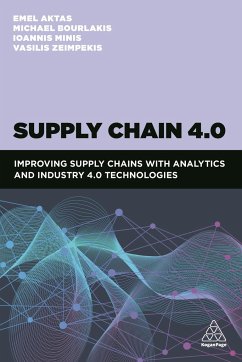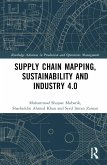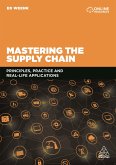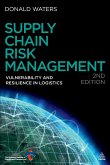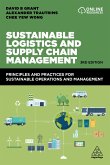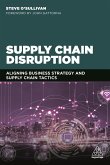Dr Emel Aktas, Professor Michael Bourlakis, Ioannis Minis
Supply Chain 4.0
Improving Supply Chains with Analytics and Industry 4.0 Technologies
Dr Emel Aktas, Professor Michael Bourlakis, Ioannis Minis
Supply Chain 4.0
Improving Supply Chains with Analytics and Industry 4.0 Technologies
- Broschiertes Buch
- Merkliste
- Auf die Merkliste
- Bewerten Bewerten
- Teilen
- Produkt teilen
- Produkterinnerung
- Produkterinnerung
Learn from research into smart, integrated and sustainable logistics practices, with a focus on market requirements and cutting edge applications from innovators in the logistics industry.
Andere Kunden interessierten sich auch für
![Supply Chain Mapping, Sustainability, and Industry 4.0 Supply Chain Mapping, Sustainability, and Industry 4.0]() Muhammad Shujaat MubarikSupply Chain Mapping, Sustainability, and Industry 4.0142,99 €
Muhammad Shujaat MubarikSupply Chain Mapping, Sustainability, and Industry 4.0142,99 €![Mastering the Supply Chain Mastering the Supply Chain]() Ed WeenkMastering the Supply Chain38,99 €
Ed WeenkMastering the Supply Chain38,99 €![Negotiation for Procurement and Supply Chain Professionals Negotiation for Procurement and Supply Chain Professionals]() Jonathan O'BrienNegotiation for Procurement and Supply Chain Professionals55,99 €
Jonathan O'BrienNegotiation for Procurement and Supply Chain Professionals55,99 €![Supply Chain Risk Management Supply Chain Risk Management]() Donald WatersSupply Chain Risk Management60,99 €
Donald WatersSupply Chain Risk Management60,99 €![Sustainable Logistics and Supply Chain Management Sustainable Logistics and Supply Chain Management]() David B. GrantSustainable Logistics and Supply Chain Management64,99 €
David B. GrantSustainable Logistics and Supply Chain Management64,99 €![Logistics and Supply Chain Innovation Logistics and Supply Chain Innovation]() John Manners-BellLogistics and Supply Chain Innovation58,99 €
John Manners-BellLogistics and Supply Chain Innovation58,99 €![Supply Chain Disruption Supply Chain Disruption]() Steve O'SullivanSupply Chain Disruption66,99 €
Steve O'SullivanSupply Chain Disruption66,99 €-
-
-
Learn from research into smart, integrated and sustainable logistics practices, with a focus on market requirements and cutting edge applications from innovators in the logistics industry.
Hinweis: Dieser Artikel kann nur an eine deutsche Lieferadresse ausgeliefert werden.
Hinweis: Dieser Artikel kann nur an eine deutsche Lieferadresse ausgeliefert werden.
Produktdetails
- Produktdetails
- Verlag: Kogan Page Ltd
- Artikelnr. des Verlages: 11986
- Seitenzahl: 312
- Erscheinungstermin: 3. Februar 2021
- Englisch
- Abmessung: 231mm x 156mm x 20mm
- Gewicht: 488g
- ISBN-13: 9781789660739
- ISBN-10: 1789660734
- Artikelnr.: 56750774
- Herstellerkennzeichnung
- Libri GmbH
- Europaallee 1
- 36244 Bad Hersfeld
- gpsr@libri.de
- Verlag: Kogan Page Ltd
- Artikelnr. des Verlages: 11986
- Seitenzahl: 312
- Erscheinungstermin: 3. Februar 2021
- Englisch
- Abmessung: 231mm x 156mm x 20mm
- Gewicht: 488g
- ISBN-13: 9781789660739
- ISBN-10: 1789660734
- Artikelnr.: 56750774
- Herstellerkennzeichnung
- Libri GmbH
- Europaallee 1
- 36244 Bad Hersfeld
- gpsr@libri.de
Emel Aktas, Michael Bourlakis, Ioannis Minis, Vasileios Zeimpekis
Chapter - 01: Supply Chain 4.0: enabling market-driven strategies [Martin
Christopher]; Chapter - 02: Driving better customer experience in digital
supply chains [Patrick Strauss]; Chapter - 03: Blockchain in the supply
chain [Martyn Walker]; Chapter - 04: Blockchain for humanitarian supply
chain [Rameshwar Dubey, Angappa Gunasekaram, Stephen J. Childe, Benjamin T.
Hazen and Thanos Papadopoulos]; Chapter - 05: Supply Chain 4.0: the
cyber-security challenge [James Kench]; Chapter - 06: Defining and testing
system parameters for enhancing vision picking technology in warehouse
operations [Anastasios Gialos and Vasileios Zeimpekis]; Chapter - 07:
Collaborative robotics - transforming warehouse logistics [Markus Voss];
Chapter - 08: Improving cold-food quality control through the Internet of
Things and big data: an empirical case [Alexandre Luis Prim, Tiago Pedro
Nicchellatti and Roberto Goularth Mendes]; Chapter - 09: Predicting
physical distribution delays: a case study of outbound logistics [Zina Ben
Miled, Jeremy Archbold and Brooke Renee Cochenour]; Chapter - 10: Adopting
Industry 4.0 technologies in agri-food supply chains: an exploratory
investigation of drivers and barriers [Imran Ali, Sattar Satie and Vinh
Thai]; Chapter - 11: The impact of sharing economy incentives and Industry
4.0 technologies on humanitarian logistics: insights from the Iran floods
of 2019 [Hamed Seddighi and Hamid Moradlou]; Chapter - 12: In search of a
human dimension of Supply Chain 4.0: stipulating learning as a lever for
the future supply chain organization [Henning de Haas, John Bang Mathiasen,
Søren Skjold Andersen and Torben Tambo]
Christopher]; Chapter - 02: Driving better customer experience in digital
supply chains [Patrick Strauss]; Chapter - 03: Blockchain in the supply
chain [Martyn Walker]; Chapter - 04: Blockchain for humanitarian supply
chain [Rameshwar Dubey, Angappa Gunasekaram, Stephen J. Childe, Benjamin T.
Hazen and Thanos Papadopoulos]; Chapter - 05: Supply Chain 4.0: the
cyber-security challenge [James Kench]; Chapter - 06: Defining and testing
system parameters for enhancing vision picking technology in warehouse
operations [Anastasios Gialos and Vasileios Zeimpekis]; Chapter - 07:
Collaborative robotics - transforming warehouse logistics [Markus Voss];
Chapter - 08: Improving cold-food quality control through the Internet of
Things and big data: an empirical case [Alexandre Luis Prim, Tiago Pedro
Nicchellatti and Roberto Goularth Mendes]; Chapter - 09: Predicting
physical distribution delays: a case study of outbound logistics [Zina Ben
Miled, Jeremy Archbold and Brooke Renee Cochenour]; Chapter - 10: Adopting
Industry 4.0 technologies in agri-food supply chains: an exploratory
investigation of drivers and barriers [Imran Ali, Sattar Satie and Vinh
Thai]; Chapter - 11: The impact of sharing economy incentives and Industry
4.0 technologies on humanitarian logistics: insights from the Iran floods
of 2019 [Hamed Seddighi and Hamid Moradlou]; Chapter - 12: In search of a
human dimension of Supply Chain 4.0: stipulating learning as a lever for
the future supply chain organization [Henning de Haas, John Bang Mathiasen,
Søren Skjold Andersen and Torben Tambo]
Chapter - 01: Supply Chain 4.0: enabling market-driven strategies [Martin
Christopher]; Chapter - 02: Driving better customer experience in digital
supply chains [Patrick Strauss]; Chapter - 03: Blockchain in the supply
chain [Martyn Walker]; Chapter - 04: Blockchain for humanitarian supply
chain [Rameshwar Dubey, Angappa Gunasekaram, Stephen J. Childe, Benjamin T.
Hazen and Thanos Papadopoulos]; Chapter - 05: Supply Chain 4.0: the
cyber-security challenge [James Kench]; Chapter - 06: Defining and testing
system parameters for enhancing vision picking technology in warehouse
operations [Anastasios Gialos and Vasileios Zeimpekis]; Chapter - 07:
Collaborative robotics - transforming warehouse logistics [Markus Voss];
Chapter - 08: Improving cold-food quality control through the Internet of
Things and big data: an empirical case [Alexandre Luis Prim, Tiago Pedro
Nicchellatti and Roberto Goularth Mendes]; Chapter - 09: Predicting
physical distribution delays: a case study of outbound logistics [Zina Ben
Miled, Jeremy Archbold and Brooke Renee Cochenour]; Chapter - 10: Adopting
Industry 4.0 technologies in agri-food supply chains: an exploratory
investigation of drivers and barriers [Imran Ali, Sattar Satie and Vinh
Thai]; Chapter - 11: The impact of sharing economy incentives and Industry
4.0 technologies on humanitarian logistics: insights from the Iran floods
of 2019 [Hamed Seddighi and Hamid Moradlou]; Chapter - 12: In search of a
human dimension of Supply Chain 4.0: stipulating learning as a lever for
the future supply chain organization [Henning de Haas, John Bang Mathiasen,
Søren Skjold Andersen and Torben Tambo]
Christopher]; Chapter - 02: Driving better customer experience in digital
supply chains [Patrick Strauss]; Chapter - 03: Blockchain in the supply
chain [Martyn Walker]; Chapter - 04: Blockchain for humanitarian supply
chain [Rameshwar Dubey, Angappa Gunasekaram, Stephen J. Childe, Benjamin T.
Hazen and Thanos Papadopoulos]; Chapter - 05: Supply Chain 4.0: the
cyber-security challenge [James Kench]; Chapter - 06: Defining and testing
system parameters for enhancing vision picking technology in warehouse
operations [Anastasios Gialos and Vasileios Zeimpekis]; Chapter - 07:
Collaborative robotics - transforming warehouse logistics [Markus Voss];
Chapter - 08: Improving cold-food quality control through the Internet of
Things and big data: an empirical case [Alexandre Luis Prim, Tiago Pedro
Nicchellatti and Roberto Goularth Mendes]; Chapter - 09: Predicting
physical distribution delays: a case study of outbound logistics [Zina Ben
Miled, Jeremy Archbold and Brooke Renee Cochenour]; Chapter - 10: Adopting
Industry 4.0 technologies in agri-food supply chains: an exploratory
investigation of drivers and barriers [Imran Ali, Sattar Satie and Vinh
Thai]; Chapter - 11: The impact of sharing economy incentives and Industry
4.0 technologies on humanitarian logistics: insights from the Iran floods
of 2019 [Hamed Seddighi and Hamid Moradlou]; Chapter - 12: In search of a
human dimension of Supply Chain 4.0: stipulating learning as a lever for
the future supply chain organization [Henning de Haas, John Bang Mathiasen,
Søren Skjold Andersen and Torben Tambo]

